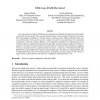Free Online Productivity Tools
i2Speak
i2Symbol
i2OCR
iTex2Img
iWeb2Print
iWeb2Shot
i2Type
iPdf2Split
iPdf2Merge
i2Bopomofo
i2Arabic
i2Style
i2Image
i2PDF
iLatex2Rtf
Sci2ools
CRYPTO
2010
Springer
2010
Springer
Oblivious RAM Revisited
We reinvestigate the oblivious RAM concept introduced by Goldreich and Ostrovsky, which enables a client, that can store locally only a constant amount of data, to store remotely n data items, and access them while hiding the identities of the items which are being accessed. Oblivious RAM is often cited as a powerful tool, which can be used, for example, for search on encrypted data or for preventing cache attacks. However, oblivious RAM it is also commonly considered to be impractical due to its overhead, which is asymptotically efficient but is quite high: each data request is replaced by O(log4 n) requests, or by O(log3 n) requests where the constant in the "O" notation is a few thousands. In addition, O(n log n) external memory is required in order to store the n data items. We redesign the oblivious RAM protocol using modern tools, namely Cuckoo hashing and a new oblivious sorting algorithm. The resulting protocol uses only O(n) external memory, and replaces each data r...
Related Content
| Added | 08 Nov 2010 |
| Updated | 08 Nov 2010 |
| Type | Conference |
| Year | 2010 |
| Where | CRYPTO |
| Authors | Benny Pinkas, Tzachy Reinman |
Comments (0)

